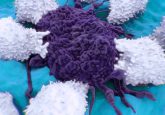Novel strategies in cancer management: can a new biosensor lead to earlier diagnosis?

New findings published in the journal Analytical Chemistry in January have discovered a potential biosensor that may be used for faster and more accurate diagnosis of cancer. This newly developed biosensor was able to detect autoantibodies produced by cancerous cells in patients either diagnosed with or at high risk of developing cancer.
In recent years, the use of autoantibodies, which are produced in response to when a tumour first begins to develop, has shown great potential for the diagnosis, prognosis and management of cancer in patients.
As these autoantibodies are produced before the symptoms of cancer begin, it is thought that measuring their expression may be an effective means of detecting cancer at its earliest stages.
In this study, researchers at the University of Madrid (Madrid, Spain) investigated the use of a biosensor that uses modified magnetic microcarriers for the selective capture of specific autoantibodies.
In collaboration with the Instituto de Investigaciones Biomédicas Alberto Sols (Madrid, Spain) and other hospitals, serum was taken from 24 patients believed to be at a high risk of developing colorectal cancer and 6 patients who had already been diagnosed with either colorectal or ovarian cancer.
By exposing the biosensor to the serum samples, researchers in this study were able to detect the autoantibody known to be produced against the p53 protein.
Co-author of this study and Professor of Analytical Chemistry at the University since 1994, José Manuel Pingarrón, explains why this protein is so important for these findings: “This protein is known as the guardian of the genome because it repairs DNA mutations, avoiding alterations in the cell cycle and the appearance of tumors”.
In approximately 10-40% of cancer cases where the p53 protein has malfunctioned, the immune system produces these autoantibodies, which signals a possible malignant transformation.
Rodrigo Barderas, who also co-authored in this study, remarks on the significance of these findings: “The presence of antibodies against p53 could be indicative of the existence of a neoplastic disease already initiated or of the risk of developing cancer in the near future”.
The speed, cost-effectiveness, and sensitivity of this biosensor also suggest that it may be a possible future alternative to current conventional protocols for determining protein expression levels, such as ELISA.
Furthermore studies have also demonstrated that this biosensor may also be used to monitor the course of disease in patients, as p53 levels have been shown to decrease when the cancerous tumour levels also decrease.
The next step will be to perform follow-up studies on the participants who demonstrated a high risk of cancer development. These results are of a huge significance in cancer research, and may have a wide range of applications for cancer management in the future.
Source: Garranzo-Asensio M, Guzman-Aranguez A, Povés C et al. Toward Liquid Biopsy: Determination of the Humoral Immune Response in Cancer Patients Using HaloTag Fusion Protein-Modified Electrochemical Bioplatforms. Anal. Chem. 88, 12339–12345 (2016).



